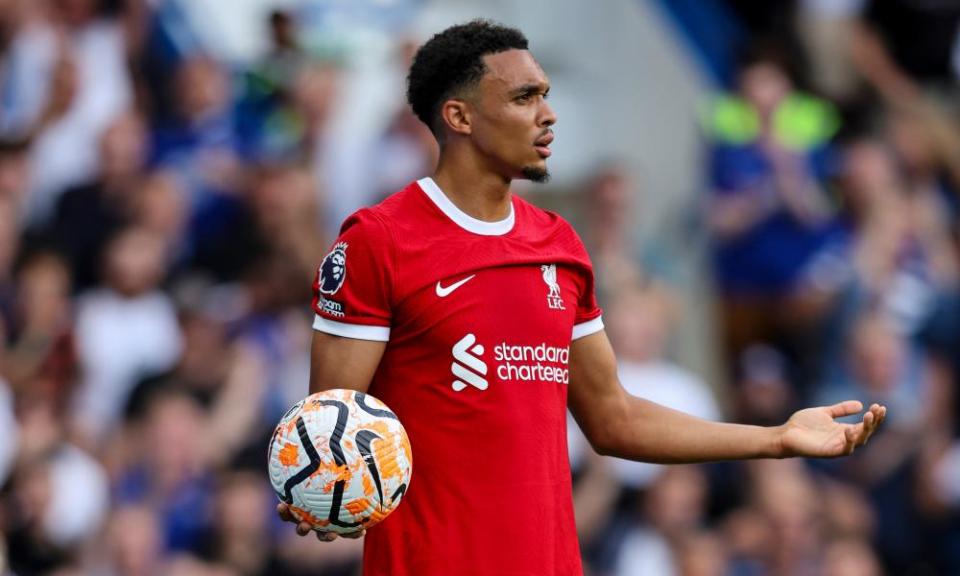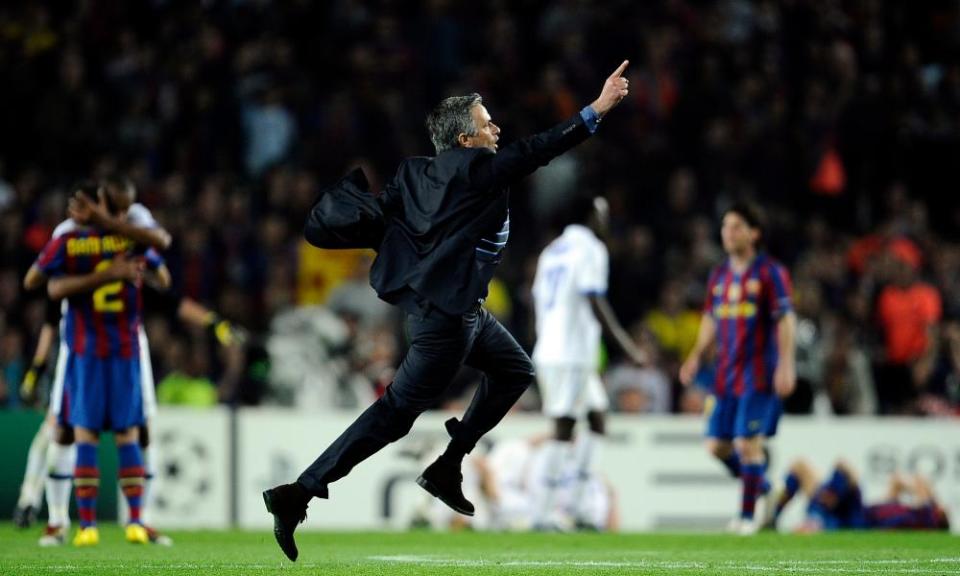Time-wasting in football is ugly, maddening – and absolutely vital

It was a bright, clammy afternoon in August, and the clocks were striking one hundred and thirteen. Midway through the second half at Stamford Bridge on Sunday, with the score 1-1, Chelsea engaged in a spell of concerted forward thrust, and with Liverpool adjusting to a double substitution, Trent Alexander-Arnold pressed the damper pedal for a moment.
The whole thing took about 10 seconds. Alexander-Arnold walked backwards, looked around, feigned a couple of throws, using the moment as a peg to reset his team’s shape, to let the lactic acid fade a little, to alter the balance of energies. The only really notable part of this sly but deceptively complex process, the football that happens in between the football, was the bit where Anthony Taylor came striding across to administer a thrillingly state-of-the-art booking, the card flourished with a kind of righteousness, a ceremonial rage.
Related: PFA chairman warns of growing player unrest over increased added time
Welcome to the latest version of our own dear old micro-engineered entertainment product, a place where referees are now present not just to keep the mechanics of the game working, to understand handball and fouls and offside, but to police how football should feel and look, to decide what exactly can be deemed entertainment.
Enter the referee as TV floor manager, gameshow compere, glove puppet of the broadcast rights holders. Get that ball moving, son. Delete what you thought you knew about the deeper rhythms of this complex game of physical chess. We’re all smiling for the cameras now.
It is now two weeks since the onset of the International Football Association Board’s latest tinkering with the spectacle. This season’s crackdown – because there must always be a crackdown – centres on various aspects of comportment and behaviour. Most notable and most covertly transformative is the brief empowering of referees to take aggressive action against time-wasting. And make no mistake, this is a profound and quietly sinister little tweak, a value judgment taken without any broader consultation on what the game should look and feel like, with some deeply undesirable implications
Not in outline, obviously. Nobody likes time-wasting (well, some people do, at certain times and passionately so: these people are called “fans” and watch matches in stadiums, but more of them later). Either way, this is on the face of it entirely reasonable. Penalising time-wasting is already explicit in the laws of the game. This is a vice that needs to be managed.
But like this? The new directive gives this watching brief an extremist mandate. And so far there have been two clear side effects. First, games that just refuse to end, the horror of footballing purgatory, with all the obvious hazards to player welfare in a game where everyone is always running through that red mist, tendons twanging, mental resources stretched to their limits.
Why is this happening? As ever, follow the money. The drive to increase active “game time” (itself a vapid, ill-defined concept) comes directly from Fifa. And Fifa is essentiality a TV rights distributions agency, its entire model based around increasing screen revenues. What we have here is the laws of the game being employed as a tool to doctor the perceived TV entertainment value of the product; as expressed via a massively overengineered notion of what the referee’s role should be, clumsily grasped value judgments of what entertainment looks like, and how this sport, our own shared treasure, should feel and look.

And, as ever, this process is focused on the experience, however muted and distant of the casual TV eyeball, the idea that football must present itself as the same homogenised constant-motion product at all times, must grasp the attention span of the passing viewer, must contain no dead air or cold product. And this is in itself a profound, top-down change, enacted without any obvious mandate. Football is not a gameshow. This is not choreographed entertainment. The reason this thing has survived and flourished is precisely because it is messy and feverish, made up of both piano and forte, moments of fury interspersed with interludes of vital, brain-mangling boredom.
And yes, time-wasting is part of the game, an ugly, maddening part, but a source of beauty in its referred effects; not to mention an entirely legitimate tactic in a 90-minute game. The clock has always been a massively important part of the game’s dynamic. The clock is never your friend, as Johan Cruyff once pointed out. If you’re losing, it moves too quickly; if you’re winning it taunts you another way, crawling along to its end point. Mess with that delicate relationship, the balance of time and motion, and you’re messing with a key element of the game’s beauty. Are we really ready to pass this over to the ad hoc judgment of a pumped-up man in shorts with a pocket full of cards and short-fused overlords in his ear?
Take away time-killing and you take away the cold, hard brutal thrills of José Mourinho’s 10-man defensive trench football against Barcelona in 2010. Take away the right to spoil and bend the rules and you lose so many gears, so many thrilling moments. In any case, who gets to decide what’s fun? Are we going to have to start sending off Brighton’s players for employing their deep, matador press, or legislating Spain 2010 out of existence? Should we cancel Liverpool’s European Cup victories because of the degree of pass-back control in those thrillingly tight away days?
More to the point, this is one more route toward cancelling the vital, nourishing thrills of cup upsets, underdog triumphs, 10-player rearguards, those high-tension rides that are only really made possible by what Taylor would deem time-wasting. But hey, the product is the product. Dead air will not be tolerated. The future does not lie in the glorious agonies of the real-life crowd but in a kind of rolling screen product in which Billionaire FC are free to walk the ball repeatedly into the net of Filler United, thereby engineering a sufficient supply of generic goal incident for the passing viewer.
Plus, of course, all of this is based in the familiar bad science. Even the concept of “ball-in-play time” is based on the some very basic numbers. The end game is to increase the Premier League’s average ball-in-play time from almost 55 minutes to something more like 56 and a half minutes. Does this sound like a reasonable aim? To erase parts of the game, to book players, to increase the risk of injury, with the end goal of seeing another minute and half of sideways passing in an experience lasting almost an hour and a half?
Does anyone really think there’s not enough effort and energy here? Football has never been so intense. Players at the elite level run constantly. This is a game of sprints and pressing and collisions. Perhaps the need to slow the game, to enforce some mini-breaks, is a function of this overload of intensity. Here we have footballers pushing themselves to the edge of injury every game. Do they really need to be told to stop slacking and get on with it?
“People will have to understand that some behaviours that previously would have been managed or ignored will no longer be managed or ignored,” Howard Webb, the chief refereeing officer for Professional Game Match Officials Limited (PGMOL), told the BBC recently, the kind of ludicrously puffed-up statement even other ludicrously puffed-up statements look at and say: “Wow, that really is ludicrously puffed-up.”
How about we start by allowing the game to breathe, to take its tactical lead from players and coaches not TV directors, and allowing this thing to exist in the flesh a little more, where the odd delayed throw-in is simply another note in the theatre?
Football is not a gameshow. It’s light and shade, energy and ennui, dark arts as well as moments of beauty. Even, at times, wasted time.

 Yahoo Sport
Yahoo Sport 





































